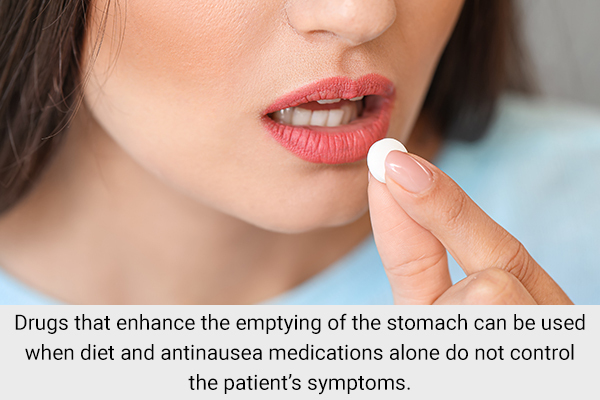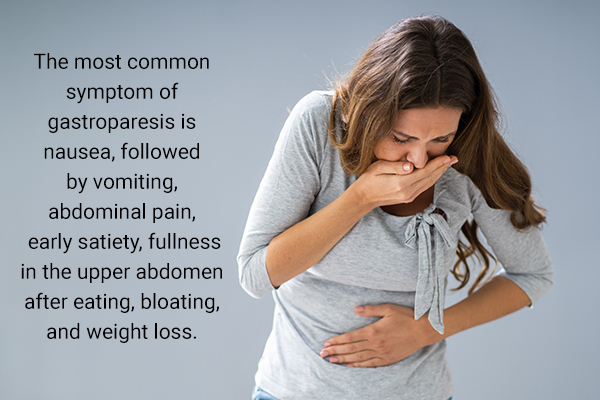In this article:
The food that you eat is pushed through the digestive tract by the repeated contraction of the stomach muscles, which are controlled by the vagus nerve.

However, certain factors can hamper this muscle motility, resulting in slow emptying of the stomach contents. This condition is referred to as gastroparesis, which causes a sizeable mass of food to stay in the stomach for prolonged periods, resulting in a variety of uncomfortable symptoms. (1)
What Is the Best Treatment Plan for Gastroparesis?
Gastroparesis is treated according to the severity of the patient’s symptoms.
Home treatment
Mild cases can be managed at home with the following interventions:
- Dietary management is the first line of treatment for gastroparesis. Smaller-volume, low-fiber, low-fat diets are generally better tolerated. This is because fiber requires intact gastric/stomach motility to break the fiber into smaller pieces (2) and fats slow the emptying of the stomach.
- Chewing food properly can make it easier for your stomach to digest the food.
- For those patients who cannot tolerate solids, puréed or liquid diets are recommended. In extreme cases where the emptying of liquids is delayed, a feeding tube can be placed into the small intestine.
- Patients with diabetes are advised to keep their blood sugar within optimum range to reduce the risk of nerve damage that causes gastroparesis as well as increases the frequency of flare-ups. (3) This can be achieved through proper dietary control, physical activity, and medication.
- In conjunction with diet, antinausea medications can be used.
- Ginger may enhance gastric emptying and reduce nausea. (4)
- Consuming peppermint or chamomile tea and bitters may help facilitate better digestion and relieve the symptomatic distress associated with this condition.
- Applying peppermint oil may help reduce abdominal pain. (5)
- Placing a hot compress on the stomach or taking a warm bath may alleviate the pain associated with gastroparesis.
- Staying active can improve the movement of the stomach muscles and overall digestion.
Medical treatment

Drugs that enhance the emptying of the stomach can be used when diet and antinausea medications alone do not control the patient’s symptoms.
Such medications are referred to as prokinetic agents and include metoclopramide, domperidone (only available in Canada), erythromycin, azithromycin, and cisapride. All of these medications have potential side effects, which should be discussed with your prescribing physician before taking them.
Tricyclic antidepressants (TCA) are not prokinetic agents but have been found to reduce abdominal pain, nausea, and vomiting in patients with idiopathic gastroparesis. (6) However, this medication can exacerbate gastroparesis in some cases.
Other therapies
Certain treatment modalities can be helpful, but more data are needed to confirm their role in the treatment of gastroparesis. These include:
- Pyloromyotomy, transpyloric stent, and pyloroplasty aim to enhance emptying of the stomach by increasing the opening of the pylorus. Injection of the pylorus with Botox was not shown to be helpful in a randomized controlled trial. (7)
- Acupuncture may reduce the symptoms of fullness after eating, early satiety, and bloating. Plus, it can stimulate the vagus nerve to increase the motility of the stomach muscles.
- Gastric electrical stimulation can reduce nausea and vomiting when narcotics are not being used and abdominal pain is not a predominant symptom.
What Are the Major Causes of Gastroparesis?
Gastroparesis can be the result of any of the following:
- One of the more common causes of gastroparesis is autonomic neuropathy secondary to diabetes mellitus. It occurs more commonly in type 1 than in type 2 diabetics. Optimal blood sugar control reduces the risk of developing this complication. (8)
- Other less common causes include post-infectious gastroparesis, post-surgery, neurological disease, and autoimmune disease.
- Norwalk virus and rotavirus infections, which cause nausea, vomiting, and diarrhea, can be followed by the development of gastroparesis in some patients. (9)
- Neurologic diseases affecting the vagus nerve and lower thoracic spinal sympathetic outflow can be associated with gastroparesis. Examples include multiple sclerosis, brain stem stroke or tumor, Parkinson’s disease, amyloid neuropathy, or primary dysautonomias (dysfunction of the autonomic nervous system).
- Surgical procedures leading to inadvertent vagal nerve injury can be complicated by gastroparesis. Such procedures include fundoplication, Billroth II gastrectomy, paraesophageal hernia repair, and lung or heart transplant.
- Medications that can delay emptying of the stomach include narcotics, alpha-2 adrenergic agonists (e.g., clonidine), tricyclic antidepressants (e.g., amitryptiline), calcium channel blockers (e.g., nifedipine), dopamine agonists (e.g., pramipexole), muscarinic cholinergic receptor antagonists (e.g., scopolamine), octreotide, glucagon-like peptide-1 agonists (e.g., exenatide), phenothiazines (e.g., chlorpromazine), cyclosporine, and immune checkpoint inhibitors (e.g., pembrolizumab).
- Diseases that infiltrate the lining of the stomach, such as certain types of cancer or amyloidosis, can lead to delayed emptying of the stomach.
- Autoimmune diseases affecting the smooth muscle of the stomach and intestine, such as scleroderma, can be a cause of gastroparesis.
- Idiopathic gastroparesis, where the cause is unknown, is the most common type of gastroparesis accounting for almost half of the cases. (10)
What Are the Common Symptoms of Gastroparesis?

The most common symptom of gastroparesis is nausea, followed by vomiting, abdominal pain, early satiety (getting full easily), fullness in the upper abdomen after eating, bloating, and weight loss.
How Is Gastroparesis Diagnosed?
If gastroparesis is being considered, it is important to rule out delayed gastric emptying due to a blockage in the stomach. To that end, the doctor may conduct an imaging study or an upper endoscopy.
A nuclear medicine gastric emptying study as well as a wireless motility capsule can be done to assess the emptying of the stomach.
What Tips and Tricks Work Against Gastroparesis?
- Modify your diet.
- Increase fluid intake.
- Include probiotic foods in the diet.
- Consume ginger.
- Take vitamin D supplements.
- Include peppermint in the diet.
- Control blood sugar levels.
What Precautions Can Be Taken Against Gastroparesis?

This is difficult to answer as, in most cases, the cause is unknown. In the case of diabetes, better blood sugar control reduces the risk of developing gastroparesis.
Who Is Prone to Gastroparesis?
Gastroparesis occurs more often in women (9.6 per 100,000 person-years women compared to 2.4 per 100,000 person-years men). (11)
People with diabetes are at a higher risk of developing the condition, and those with type 1 diabetes have a higher risk than those with type 2.
When to See a Doctor
If you experience persistent unexplained nausea and/or vomiting, seek professional help.
Final Word
Treatment for gastroparesis oftentimes involves treatment of the symptoms since in many cases the underlying cause of the delay in emptying is either unknown or not treatable. It usually involves the use of a variety of different modalities mentioned above.
- Was this article helpful?
- YES, THANKS!NOT REALLY


